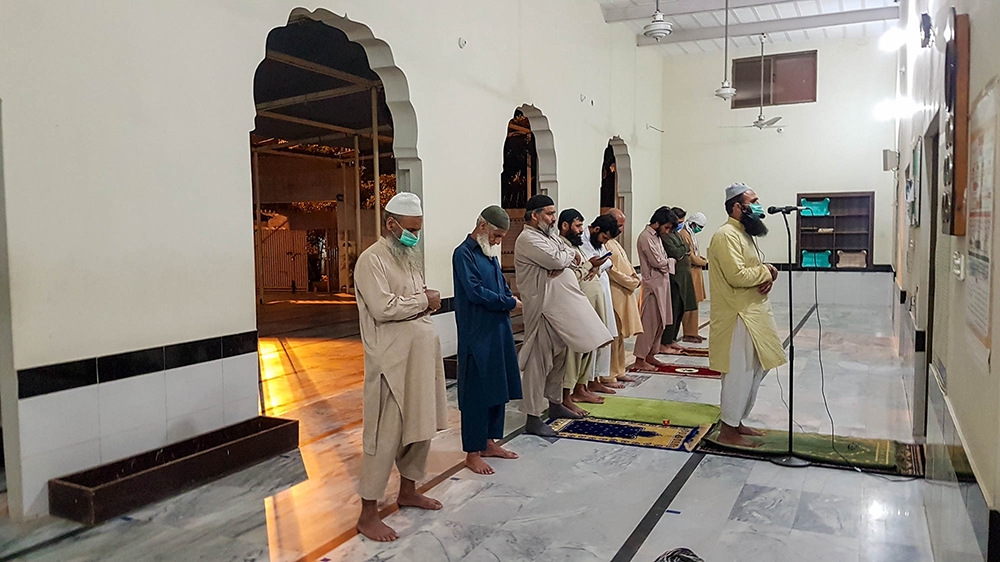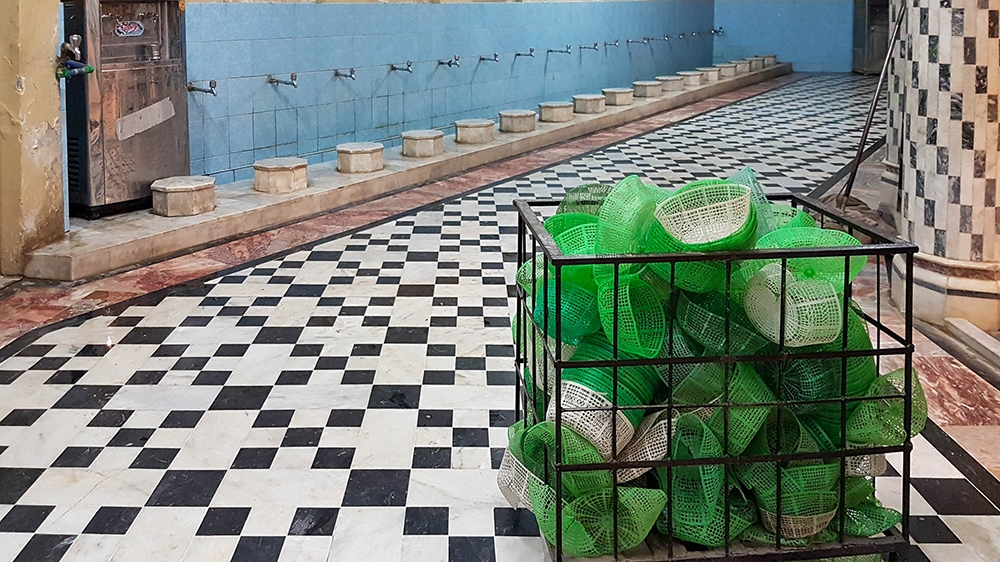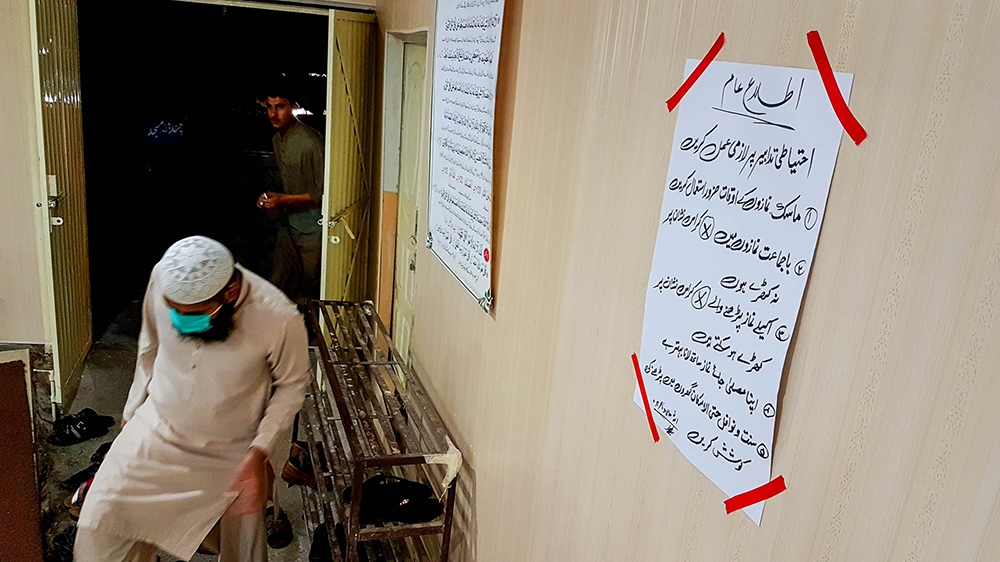In Pakistan, mosques become coronavirus battleground issue
Tens of thousands of mosques across the country were reopened late last month, despite the coronavirus pandemic.

Islamabad, Pakistan – As night falls, worshippers file into the Abdullah bin Masood mosque, in the Pakistani capital Islamabad, hurrying up the steps to attend newly recommenced congregational prayers.
Inside, more than 200 people are gathered, separated by a few feet between them – to maintain physical distancing – as they offer tarawih prayers, a special Muslim prayer offered in the holy month of Ramadan.
Keep reading
list of 4 itemsMexico’s teachers seek relief from pandemic-era spike in school robberies
‘A bad chapter’: Tracing the origins of Ecuador’s rise in gang violence
Why is the US economy so resilient?
There is not a face mask or bottle of hand sanitiser to be seen, as more worshippers walk past the police picket outside to crowd into the mosque’s inner chamber, with its fluorescent lights twinkling off the latticed mirror ceiling.
“Essential services have been reopened, and offering prayers as part of a congregation is also an essential service,” Hanif Jallandhri, a Pakistani religious leader who leads a network of more than 20,000 mosques and religious schools, tells Al Jazeera.
In most Muslim countries, authorities have, with the backing of religious leaders, shut down all mosques to the public in a bid to contain the spread of the highly contagious coronavirus, which has claimed more than 247,500 lives worldwide, according to Johns Hopkins University data.
In Pakistan, however, tens of thousands of mosques across the country reopened late last month, after religious leaders prevailed upon the government of Prime Minister Imran Khan to allow them to restart congregational services.
It is a unique decision, among Muslim countries, and one that ties into the complex interplay of how political and social power flows in a country where religion is central to public life but does not have a formalised role within State structures.
The result is a constant push-and-pull between religious and political leaders, such as has been seen over the decision to reopen mosques.
‘Islamic Republic’ vs ‘Islamist’ republic
Cases of the coronavirus in Pakistan crossed 20,000 early this month, with at least 526 people dead and more than 6,200 having recovered. Cases have been rising exponentially in recent days, and are expected to hit more than 130,000 by the end of May.
At least 2,682 cases, or 12 percent of the country’s total cases, can be traced back to a single religious gathering by the Tableeghi Jamat missionary organisation outside the eastern city of Lahore in March. It is the largest single group of those infected in the country’s outbreak so far.
Part of the issue for Prime Minister Khan’s government – which has advocated for loose shutdowns since the start of the outbreak – when taking on religious leaders is one that goes back to the foundation of the country as a homeland for the Muslims of the subcontinent, in 1947.
“Pakistan is sort of a unique case,” says Ahsan Butt, a political scientist at the George Mason University in the US state of Virginia.
“It’s a case where it’s a state built on Muslim nationalism, so Islam and Muslim identity are crucial to the State and the wider society, and the conception of the collective self.
“But it is not erected strictly as a Muslim or Islamist state, like Iran or Saudi Arabia.”

As a result, Butt explains, religious leaders and institutions wield a great deal of influence and social power but are not explicitly a part of the State. By comparison, states where religious authority is melded into governance, like Saudi Arabia, have been more able to control their religious establishments during the coronavirus outbreak, shutting down places of worship, including the holiest site in Islam, the Kaaba.
“So this leads to a dichotomy: that Islam is central to Pakistan’s being, but [religious] actors are, in their perception, outside the State. Clerics may influence the country very strongly, but they are not the ones actually in power.”
Religious parties have never won a significant number of seats in Pakistani elections. Butt argues that they rely instead on “latent power, not juridical power”.
“Their power comes from their standing and status; it comes from the threat of coming out on the street.”
‘Impossible to enforce’ plan
Tensions came to the fore on April 14, when an alliance of religious leaders from across the Pakistani Muslim sectarian spectrum – a rare occurrence – came together to declare that they were unilaterally reopening mosques for congregational prayers, in defiance of government lockdown orders.
The step prompted the government to negotiate with a committee of religious leaders, agreeing to a 20-point plan for reopening mosques from late April. The steps include enforcing physical distancing guidelines between worshippers, discouraging the sick and elderly from attending prayers, providing hand sanitiser to congregants and discouraging socialising within the mosque.
Days later, leading Pakistani doctors warned that the decision could lead to a spike in coronavirus cases. Religious leaders say they will take responsibility for implementing the directives and that the government can act if rules are not followed.
In visits to observe congregational prayers at six major mosques in the Pakistani capital, Al Jazeera observed varying levels of compliance with the safety directives. In some, a handful of congregants stood more than six feet (two metres) apart and only those wearing face masks were allowed inside. In others, hundreds of worshippers crowded in, shoulder-to-shoulder, to offer prayers with no safety precautions visible.
“It’s impossible to enforce,” says Madiha Afzal, a fellow at the Brookings Institution who studies political economy and extremism.
“The buck is on the [the mosque leader]. Who is going to ensure that the cleric is doing this? Can there be any authority that ensures this all over the country, [five] times a day?”
So why does the Pakistani government itself not enforce these rules more strictly, forcing the religious leaders to obey government-mandated guidelines?
Afzal argues that this is because of how religious authority in Pakistan is organised – in a decentralised structure not controlled by the State.
“The Pakistani state does not have the ability to be authoritarian in terms of religion,” she says. “It is the Islamic republic, but it is not a theocracy. It’s a democracy with a very […] complicated relationship with religion,” says Afzal.

Butt concurs with that analysis.
“Pakistan is not a fully democratic state, but unlike Egypt, for instance, where the State can clamp down on protests and collective action and on freedom of assembly pretty easily, regardless of who is doing it […] Pakistan does not have that fully authoritarian structure,” he says.
Both experts, however, were quick to point out that the Pakistani state had a history of taking authoritarian measures against other types of actors – those opposing the country’s powerful military or advocating for causes deemed prejudicial to national security interests, for example.
Questions of social power
For religious leaders, bound in a constant push-and-pull for social and political power with the State, the calculus in such a situation appears fairly clear.
“If you have religious institution or mosques shut down, then the question arises that you have all these other [groceries and businesses] that are open, does that imply that religious aspects of our lives are less important?” asks Arsalan Khan, an anthropologist who studies Islamic revivalist movements in South Asia. “This is a deen [religion] versus duniya [worldly concerns] problem.”
For leaders of organised religion, Khan says “there is a real fear, across the board, that religion will be rendered unimportant”.
“When the politics of religion is organised around the sense that religious feeling is essential to the wellbeing of society, then it is hard to argue that mosques should be closed.”
Jallandhri, the religious leader, says Pakistanis need to take “spiritual” steps to combat the virus, in addition to hygiene precautions.
“The government has opened many sectors to ease the lockdown,” he says. “Our position is that if you open groceries, bazaars, banks, other types of businesses, then the mosque should also be reopened.”
There are also very real financial implications for religious institutions if they remain closed. Pakistan’s government is largely uninvolved in regulating or financing mosques across the country, leaving that up to independent religious boards and organisations.
“These [mosques and religious leaders] are basically freelancers, and it is a pretty vicious market, with tens of thousands of mosques,” says Butt. “They need the donations [and] a lot of it comes from foot traffic – if you cut that during Ramadan, then you cut their income significantly for the year, not just that month.”

For religious leaders, there is also the danger of not being seen to adequately protect the place of religion in society, and being “outflanked” by others who are willing to take a harder line.
“If I, as a leader of [a] mosque, don’t take the most extreme position, then the second or third in control of this mosque will look to replace me and will have a stronger [or more extreme] argument,” says Butt.
Khan agrees, suggesting that senior religious leaders who pushed for the 20-point plan to reopen mosques with the government were reacting to pressure from the bottom of their organisations.
“There is a fear [for them] that lower-tier upstarts could rise up,” he says. “Whoever can control the politics of the street, has leverage and so […] more established religious leaders are very worried about these more radical forces that come from the bottom [replacing them].”
Finally, there is the question of how religion may well be something many Pakistanis consider to be an essential service – regardless of questions of social power.
“The idea that wellbeing comes from God, this is not just religious leaders that say that, it is a widely accepted thing [in Pakistan],” says Khan. “This is not necessarily built on an irrational perception of the risk. It may be that you accept those risks, and yet you find that the importance of going to the mosque is greater.”
At a small mosque in Islamabad’s G-8 sector, questions of outflanking and potential ideological coups at the top of religious institutions feel like distant concerns.
A handful of worshippers gather for the nightly tarawih prayer. Across the road stands the Pakistan Institute of Medical Sciences (PIMS), the capital’s main government hospital and the heart of efforts to control the coronavirus outbreak here.
The worshippers stand shoulder-to-shoulder, on a bare marble floor, as the imam begins the prayer.
Asad Hashim is Al Jazeera’s digital correspondent in Pakistan. He tweets @AsadHashim